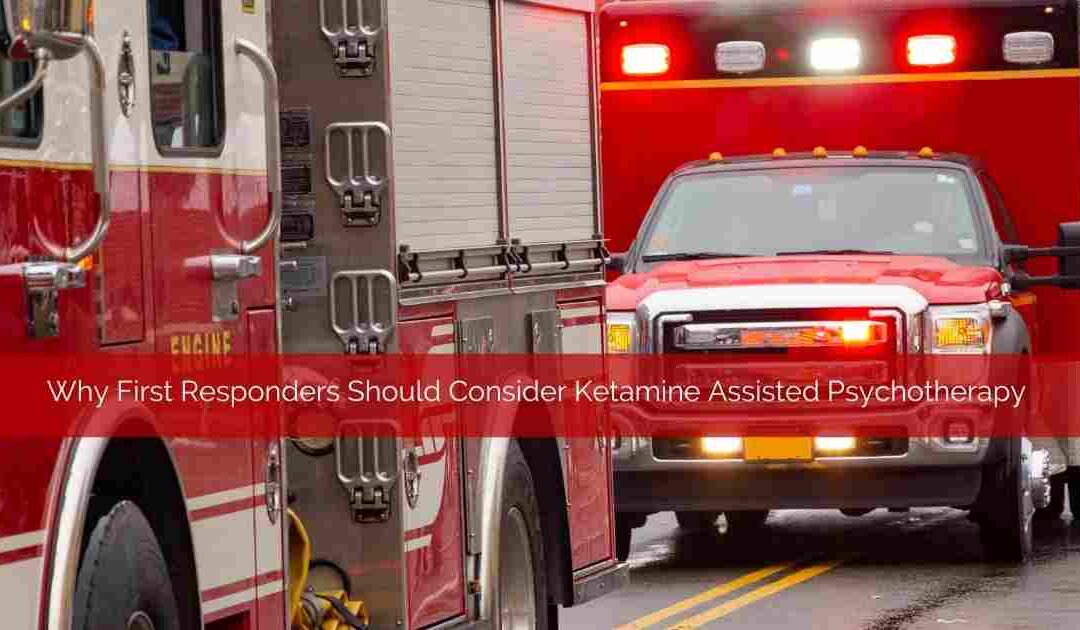First Responders often work in high-intensity situations and are at far higher risk for exposure to trauma than most other professions. This risk for trauma exposure only worsened during the COVID-19 pandemic, as many First Responders have been on the front lines of addressing the international health crisis. The cumulative nature of such frequent exposure to trauma has eroded the health and wellbeing of many First Responders. Many face ongoing challenges from depression, anxiety, posttraumatic stress disorder, burnout, and loss of fulfillment in their professional lives.
 We know that chronic exposure to traumatic or highly stressful situations can have profoundly adverse effects on the body and brain. Therefore, First Responders must have avenues to help manage the mental and emotional toll incurred from such frequent traumatic experiences. Although mental health interventions such as psychotherapy and medication can offer benefits, many First Responders feel they don’t have time or energy to access these forms of therapeutic support consistently. Conventional psychotherapy and medication interventions can take time before they are effective and require ongoing participation (e.g. daily meds, weekly/bi-monthly therapy) to preserve benefits.
We know that chronic exposure to traumatic or highly stressful situations can have profoundly adverse effects on the body and brain. Therefore, First Responders must have avenues to help manage the mental and emotional toll incurred from such frequent traumatic experiences. Although mental health interventions such as psychotherapy and medication can offer benefits, many First Responders feel they don’t have time or energy to access these forms of therapeutic support consistently. Conventional psychotherapy and medication interventions can take time before they are effective and require ongoing participation (e.g. daily meds, weekly/bi-monthly therapy) to preserve benefits.
One therapeutic option that can be both fast-acting and long-lasting is known as Ketamine Assisted Psychotherapy, and this approach has many elements that might appeal to First Responders. Ketamine Assisted Psychotherapy is unique in that it can offer tremendous benefits in a relatively short period. A full course of Ketamine Assisted Psychotherapy can take just 3-6 weeks to complete, and many participants notice benefits after their first dosing session. The treatment is particularly good for helping facilitate the release of stored-up trauma and allowing clients to experience a deeper connection with themselves and others. First Responders may find that they are feeling much more grounded, peaceful, and energized following the treatment. The positive effects can last for long periods before any additional treatments are needed.
Ketamine Assisted Psychotherapy combines the benefits of medicinal ketamine with the therapeutic guidance of a certified psychedelic assisted psychotherapist. Ketamine is an anesthetic agent that has been used since the 1970s, over the last two decades, it has been found to have potent antidepressant effects. Significant research has shown the effectiveness of ketamine for severe forms of Depression, with over 70% of depressed clients responding to the treatment. Research has also demonstrated the potential for ketamine to help with conditions such as severe anxiety, suicidal ideation, and posttraumatic stress disorder (PTSD). Even if individuals don’t have a clinical diagnosis, they can work toward resolving issues such as existential anxiety (e.g., fear of death), spirituality, identity challenges, or feelings of stagnation in one’s life. Although ketamine might be helpful on its own, the positive effects are increased and longer lasting when combined with therapeutic support.
 First Responders would undoubtedly benefit from the positive effects created through Ketamine Assisted Psychotherapy and will also appreciate the possible relatively fast results. The effects can be more profound, longer lasting, and happen on a quicker timeline than traditional psychotherapy. It is important to emphasize that ketamine is not a magic wand and will not resolve every problem an individual might have. Still, the evidence is showing improvement for the many individuals who undergo treatment. Although the medicine and concurrent therapy are powerful, they also require dedication from the participant to work toward and sustain change in their lives during and after the treatment process. To this end, Ketamine Assisted Psychotherapy helps pave the way for this change as it helps facilitate opportunities for profound emotional renewal and growth. Whereas First Responders encounter significant stressors and traumas daily, there are now resources that may help combat the adverse effects of this trauma. Given the unique advantages of Ketamine Assisted Psychotherapy, First Responders are among the communities that might benefit most from this cutting-edge treatment option, and I invite you to learn more on our website: https://catalystcenterllc.com/services/ketamine-assisted-psychotherapy/
First Responders would undoubtedly benefit from the positive effects created through Ketamine Assisted Psychotherapy and will also appreciate the possible relatively fast results. The effects can be more profound, longer lasting, and happen on a quicker timeline than traditional psychotherapy. It is important to emphasize that ketamine is not a magic wand and will not resolve every problem an individual might have. Still, the evidence is showing improvement for the many individuals who undergo treatment. Although the medicine and concurrent therapy are powerful, they also require dedication from the participant to work toward and sustain change in their lives during and after the treatment process. To this end, Ketamine Assisted Psychotherapy helps pave the way for this change as it helps facilitate opportunities for profound emotional renewal and growth. Whereas First Responders encounter significant stressors and traumas daily, there are now resources that may help combat the adverse effects of this trauma. Given the unique advantages of Ketamine Assisted Psychotherapy, First Responders are among the communities that might benefit most from this cutting-edge treatment option, and I invite you to learn more on our website: https://catalystcenterllc.com/services/ketamine-assisted-psychotherapy/
Photo Credits:
Photo by Acton Crawford on Unsplash
Photo by Claudio Schwarz on Unsplash

